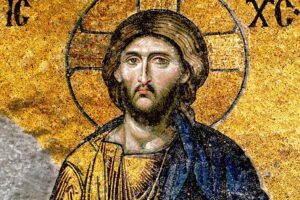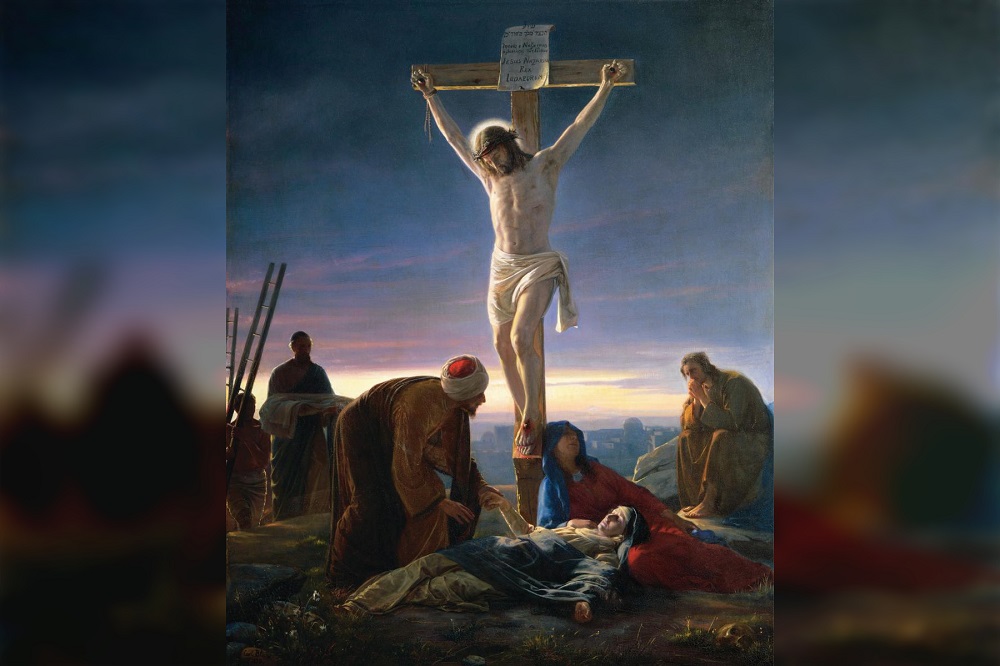The Bible’s Answer
The Bible’s answer to this question is twofold. Firstly, the Jews of Jesus’ day condemned him to death by crucifixion (John 19:14–18)—which was the most cruel form of Roman capital punishment, reserved only for the worst of criminals—based upon false charges (Mark 14:55–59). They did this because they hated him for claiming to be God (John 10:33), the promised Messiah (Mark 14:61–64), and for publicly refuting their man-made traditions (Matthew 12:9–14). Secondly, and more importantly, Jesus Christ came into the world for the exact purpose of dying by crucifixion (John 12:27, 47) so that, by his death and subsequent resurrection, humanity may be saved from sin’s consequences (John 3:16).
Why Humanity Needs to Be Saved
Because God is just, he must punish sinners (Ezekiel 18:20–21). The Bible teaches that the wages (or penalty) of sin is death (Romans 6:23), and we see that, after the first man and woman (Adam and Eve) sinned, death spread to all of creation (Romans 5:12; Genesis 3). Sin separates humans from a relationship with God (Romans 5:10), and because all humans have sinned (Romans 3:23), all humans deserve to die and receive eternal punishment in Hell (Matthew 25:46; Romans 3:10–12). In his grace and mercy, though, God chose to make himself known to a remnant of humanity—a people called the Israelites—and made a covenant (pact) with them (Deuteronomy 7:6–9).
As part of this covenant, whenever the Israelites would sin, they could be forgiven by God through the temple sacrificial system. If a man or woman of God were truly sorry for their sins, they could offer the required animal sacrifice, such as a lamb, to the Levitical priests in God’s temple, and it would die in the place of the sinner, providing atonement (amends) for them (e.g. Leviticus 5:5–6). This had to be done because the Bible says that, “under the law almost everything is purified [cleansed] with blood, and without the shedding of blood there is no forgiveness of sins” (Hebrews 9:22, ESVUK). These sacrifices, though, were not perfect, and they had to be repeated since they only provided temporary atonement (Hebrews 10:11); they pointed to something greater that was to come.
Why Jesus’ Death Was Necessary for Our Salvation
The Old Testament prophets foretold that God would one day send humanity a Messiah (an Anointed One) to save them from sin and its consequences. Isaiah taught that the Messiah would do so by offering up his own life as a sacrificial offering for sin (Isaiah 53:10) and that the iniquity (sins) of all people would be laid upon him (Isaiah 53:6). The New Testament reveals that Jesus is that promised Messiah (John 4:25–26) and the great High Priest of humanity (Hebrews 6:19–20), who did not offer up an animal on our behalf, but his own life.
This is why John the Baptist called Jesus “the Lamb of God, who takes away the sin of the world” (John 1:29). Jesus never sinned in his life (Hebrews 4:15), which made him the only possible candidate to pay for our sins. Furthermore, because Jesus is both God and man (John 1:1, 14; Colossians 2:9; Titus 2:13–14; Revelation 1:17), who came down from Heaven (John 6:38), his life alone was of infinite value and could, therefore, pay our infinite sin-debt of eternal punishment (Matthew 25:46). Therefore, the Bible says that Jesus “appeared once for all at the end of the ages to put away sin by the sacrifice of himself” (Hebrews 9:26). Since Jesus’ sacrifice was perfect and complete, the temple sacrificial system has now ended; he died in the place of every sinner in the world (1 John 2:2). The author of Hebrews declared this:
And by that will we have been sanctified [made holy] through the offering of the body of Jesus Christ once for all. And every priest stands daily at his service, offering repeatedly the same sacrifices, which can never take away sins. But when Christ had offered for all time a single sacrifice for sins, he sat down at the right hand of God, waiting from that time until his enemies should be made a footstool for his feet. For by a single offering he has perfected for all time those who are being sanctified. (Hebrews 10:10–14)
Why Jesus Died on a Cross
There is a specific reason for why Jesus’ death on a wooden cross was significant. In the Old Testament, Moses taught that, in order to keep Israel ritually clean, a dead man’s body that was hanged on a tree was to be disposed of on the same day, “for a hanged man is cursed by God” (Deuteronomy 21:22–23). Paul picks up on this theology in his letter to the Galatians by relating it to Jesus’ death on the cross:
For all who rely on works of the law are under a curse; for it is written, “Cursed be everyone who does not abide by all things written in the Book of the Law, and do them.” … Christ redeemed us from the curse of the law by becoming a curse for us—for it is written, “Cursed is everyone who is hanged on a tree”—so that in Christ Jesus the blessing of Abraham might come to the Gentiles, so that we might receive the promised Spirit through faith. (Galatians 3:10, 13–14)
What we see here is that Jesus redeemed (or purchased) sinful humanity, which failed to uphold God’s law (his commandments), by becoming a curse in our place—as our substitute—on the cross. Jesus bore the curse that we should have bore—the righteous for the unrighteous (1 Peter 3:18)—so that we may receive the Holy Spirit, who delivers to us Christ’s saving grace (1 Corinthians 6:11), not through our good works, since we are lawbreakers, but through faith in Jesus.
The Apostle Peter taught that, when Jesus hung upon the tree, referring to the wood of the cross, Jesus bore all the sins of the world (that is, original sin and our personal sins) (1 Peter 2:24), just as Isaiah had foretold (Isaiah 53:6). Because Jesus bore the world’s sins in his body, the Bible says that, on the cross, Jesus became sin (2 Corinthians 5:21); it also says that God set aside our legal debt, which we incurred by breaking his law, by nailing it to the cross (Colossians 2:13–14). In this way, when Jesus died, he took our sins with him—thus destroying sin. Jesus has, therefore, fully paid our penalty. On the third day after his death, Jesus rose again from the dead in fulfilment of David’s messianic prophecy (Psalm 16:10); he then ascended back to Heaven (Romans 8:34). By his resurrection, Jesus conquered the power of death once and for all (1 Corinthians 15:22–23, 54–57).
How the Benefits of Jesus’ Death and Resurrection Apply to Us
There is only one way to receive the benefits of Jesus’ perfect life, his atoning and sacrificial death, and his resurrection from the dead. Paul teaches us how in the third chapter of the book of Romans:
But now apart from the law the righteousness of God has been made known, to which the Law and the Prophets testify. This righteousness is given through faith in Jesus Christ to all who believe. There is no difference between Jew and Gentile, for all have sinned and fall short of the glory of God, and all are justified [declared righteous] freely by his grace through the redemption that came by Christ Jesus. God presented Christ as a sacrifice of atonement, through the shedding of his blood—to be received by faith. He did this to demonstrate his righteousness, because in his forbearance he had left the sins committed beforehand unpunished—he did it to demonstrate his righteousness at the present time, so as to be just and the one who justifies those who have faith in Jesus. (Romans 3:21–26, NIVUK)
God freely justifies (that is, declares righteous) everyone who, by faith, accepts Jesus’ sacrifice of atonement. In other words, Jesus’ atonement applies to us the moment we believe it to be true for ourselves personally. The Bible promises that whoever believes in Jesus as their only Lord and Saviour—who died (and, thus, atoned) for all their sins on the cross and rose again from the dead—will be justified by God (Romans 4:24–25). They will not receive the eternal judgement from God that they deserve, but they will pass from death to eternal life (John 5:24).
In baptism, the Holy Spirit unites us with Jesus’ death and resurrection, which gives us the assurance of salvation (Romans 6:3–5). Whoever refuses to believe in Jesus as the promised Messiah and Saviour of the world will remain in their sins (John 8:24, 34) and will receive God’s just condemnation after death (John 3:18), because they reject his atonement by their unbelief.
For more Bible-based information on Christianity, please see the articles below:






